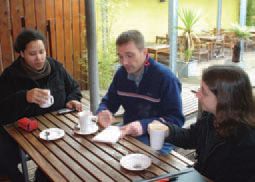
Physiology News Magazine
Public engagement made simple
Features
Public engagement made simple
Features
Erinma Ochu
University of Manchester, UK
https://doi.org/10.36866/pn.59.24

Getting involved in public engagement needn’t cost the earth or take up much time. University of Manchester researchers, Ellen Poliakoff (Psychology) and Stuart Allan (Life Sciences), teamed up with science communicator and filmmaker, Erinma Ochu, to address the issues and present solutions to widening public participation and interest in science whilst facilitating the involvement of scientists with busy schedules. Here Erinma, who also has a PhD in Neuroscience, tells how.
Whilst I enjoy devising new ways to engage scientists and the public, I am acutely aware of the barriers to participating in engagement activities, even though, with much research being publicly funded, there is a professional obligation. Planning activities takes time, especially when scientists work in isolation, planning projects from scratch with no legacy of best practice or resources to guide them. Learning the ‘hard way’ is time-consuming, exhausting and stressful and will quite possibly put people off getting involved again. Postgraduates are often too scared to ask their supervisors for permission, primarily because of the time commitment.
At Manchester we have devised a series of projects to address these concerns. A Day in the Life will show aspects of academic life for plant scientists to physiologists to nanotechnologists, whilst engaging professors to technicians. Scientists will document their everyday lives by taking photographs with disposable cameras and a photographer, David Bennett, has been commissioned to document their days. We want to capture the ordinary as well as the extraordinary lives of scientists: the coffee with colleagues, the lab meetings, jetting off to a conference and the life in the lab, to give the public a better idea of what scientists actually do. We hope to uncover similarities and differences across disciplines and with a touring exhibition and book, we want to stimulate dialogue between scientists and the public about the nature of scientists’ work whilst challenging perceptions along the way.
Why science, a documentary film project aims to show why scientists, across all levels, chose to do science in the first place. The premise for the film is to find humorous and personal stories to which the public can relate easily. My career in science began because I couldn’t decide whether I should do biology or German at GCSE level. I couldn’t do both because the timetables clashed, so I got my classmates to vote and the majority voted biology.
Both projects allow scientists to get on with their daily lives with minimal disruption.
For scientists keen to devise their own engagement activities and with a little more time, we are producing a case study CD-Rom of events that we devised for National Science Week 2005. The CD-Rom will detail how to: register your event at a festival, fund it, find a venue, target your audience, publicise and attract media coverage as well as how to evaluate and monitor it. So, there will be no need to start from scratch. Research Councils (www.rcuk.ac.uk/) also provide funding and opportunities for their scientists to take part in various engagement activities. The Medical Research Council, for example, provides engagement training and the chance to exercise communication skills at public workshops run at Cheltenham and Edinburgh festivals of science.
Another important step is for academic institutions to recognise and reward scientists making the effort to get involved. Thankfully, the British Association for the Advancement of Science is exploring how this might be achieved at their annual science communication conference (www.theba.net/the-ba/ScienceCommunication/). We will report back on the conference via www.manchesterscience.blogspot.com, which charts our progress and details other projects addressing engagement issues.
Email us to take part in any projects, particularly A Day in the life, but also to find out about planning an event or to simply contribute to the debate: erinma.ochu@manchester.ac.uk
The projects are sponsored by a Wellcome Value In People award, the University of Manchester, a BBSRC, MRC, NERC small grant award and the Medical Research Council.

